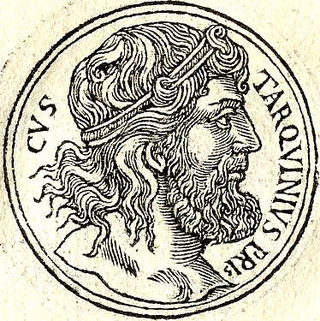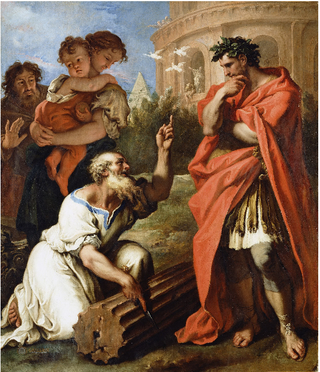
Lucius Tarquinius Priscus, or Tarquin the Elder, was the legendary fifth king of Rome and first of its Etruscan dynasty. He reigned for thirty-eight years. Tarquinius expanded Roman power through military conquest and grand architectural constructions. His wife was the prophetess Tanaquil.

Lucius Tarquinius Superbus was the legendary seventh and final king of Rome, reigning 25 years until the popular uprising that led to the establishment of the Roman Republic. He is commonly known as Tarquin the Proud, from his cognomen Superbus.

According to Roman tradition, Lucretia, anglicized as Lucrece, was a noblewoman in ancient Rome. Sextus Tarquinius (Tarquin) raped her and her subsequent suicide precipitated a rebellion that overthrew the Roman monarchy and led to the transition of Roman government from a kingdom to a republic. After Tarquin raped Lucretia, flames of dissatisfaction were kindled over the tyrannical methods of Tarquin's father, Lucius Tarquinius Superbus, the last king of Rome. As a result, the prominent families instituted a republic, drove the extensive royal family of Tarquin from Rome, and successfully defended the republic against attempted Etruscan and Latin intervention.

Servius Tullius was the legendary sixth king of Rome, and the second of its Etruscan dynasty. He reigned from 578 to 535 BC. Roman and Greek sources describe his servile origins and later marriage to a daughter of Lucius Tarquinius Priscus, Rome's first Etruscan king, who was assassinated in 579 BC. The constitutional basis for his accession is unclear; he is variously described as the first Roman king to accede without election by the Senate, having gained the throne by popular and royal support; and as the first to be elected by the Senate alone, with support of the reigning queen but without recourse to a popular vote.

Lucius Junius Brutus was the semi-legendary founder of the Roman Republic, and traditionally one of its first consuls in 509 BC. He was reputedly responsible for the expulsion of his uncle the Roman king Tarquinius Superbus after the suicide of Lucretia, which led to the overthrow of the Roman monarchy. He was involved in the abdication of fellow consul Tarquinius Collatinus, and executed two of his sons for plotting the restoration of the Tarquins.
The gens Tullia was a family at ancient Rome, with both patrician and plebeian branches. The first of this gens to obtain the consulship was Manius Tullius Longus in 500 BC, but the most illustrious of the family was Marcus Tullius Cicero, the statesman, orator, and scholar of the first century BC. The earliest of the Tullii who appear in history were patrician, but all of the Tullii mentioned in later times were plebeian, and some of them were descended from freedmen. The English form Tully, often found in older works, especially in reference to Cicero, is now considered antiquated.

Tanaquil was the queen of Rome by marriage to Tarquinius Priscus, the fifth King of Rome.
Arruns Tarquinius was one of the sons of Lucius Tarquinius Superbus, the last King of Rome. Ancient sources differ as to whether he was the second or third son. In the earliest accounts, passed through fragments of the first Roman historian, Fabius Pictor, he is the third son. According to Livy and Dionysius of Halicarnassus, he is the second son. Modern historians doubt the historicity of the specific actions attributed to Arruns and other members of his dynasty, regarding them as highly embellished by later accounts.

The gens Tarquinia was a plebeian family at ancient Rome, usually associated with Lucius Tarquinius Priscus and Lucius Tarquinius Superbus, the fifth and seventh Kings of Rome. Most of the Tarquinii who appear in history are connected in some way with this dynasty, but a few appear during the later Republic, and others from inscriptions, some dating as late as the fourth century AD.
Demaratus, frequently called Demaratus of Corinth, was the father of Lucius Tarquinius Priscus, the fifth King of Rome, the grandfather or great-grandfather of Lucius Tarquinius Superbus, the seventh and last Roman king, and an ancestor of Lucius Junius Brutus and Lucius Tarquinius Collatinus, the first consuls of the Roman Republic.

Sextus Tarquinius was one of the sons of the last king of Rome, Lucius Tarquinius Superbus. In the original account of the Tarquin dynasty presented by Fabius Pictor, he is the second son, between Titus and Arruns. However, according to Livy and Dionysius of Halicarnassus, he was either the third or first son, respectively. According to Roman tradition, his rape of Lucretia was the precipitating event in the overthrow of the monarchy and the establishment of the Roman Republic.

Lucius Tarquinius Ar. f. Ar. n. Collatinus was one of the first two consuls of the Roman Republic in 509 BC, together with Lucius Junius Brutus. The two men had led the revolution which overthrew the Roman monarchy. He was forced to resign his office and go into exile as a result of the hatred he had helped engender in the people against the former ruling house.
Arruns Tarquinius was the younger son of Demaratus of Corinth, who migrated to the Etruscan city of Tarquinii in the seventh century BC. He died shortly before his father, leaving his wife pregnant. When Demaratus died, he left no inheritance for his grandson, also named Arruns, who was thus born into poverty, although Demaratus had been wealthy. The child came to be called Egerius, meaning "the needy one."

Spurius Lucretius Tricipitinus is a semi-legendary figure in early Roman history. He was the first Suffect Consul of Rome and was also the father of Lucretia, whose rape by Sextus Tarquinius, followed by her suicide, resulted in the dethronement of King Lucius Tarquinius Superbus, therefore directly precipitating the founding of the Roman Republic. It is believed that Lucretius and his accomplishments are at least partly mythical and most ancient references to him were penned by Livy and Plutarch.
The gens Gegania was an old patrician family at ancient Rome, which was prominent from the earliest period of the Republic to the middle of the fourth century BC. The first of this gens to obtain the consulship was Titus Geganius Macerinus in 492 BC. The gens fell into obscurity even before the Samnite Wars, and is not mentioned again by Roman historians until the final century of the Republic.
Corniculum was an ancient town in Latium in central Italy.
Arruns Tarquinius was the brother of Lucius Tarquinius Superbus, the seventh and last King of Rome.

In Rome's early semi-legendary history, Tarquinia was the daughter of Lucius Tarquinius Priscus, the fifth king of Rome,. Her father, Lucius Tarquinius Priscus, gave her in marriage to Servius Tullius, the sixth king of Rome. She was the mother of Lucius Junius Brutus, who overthrew the monarchy and became one of Rome's first consuls in 509 BC. She had another son, who was put to death by Superbus after he took the Roman rule from Servius.
Titus Tarquinius was one of the sons of the last king of Rome, Lucius Tarquinius Superbus. According to Livy and fragments of the first Roman historian, Fabius Pictor, he was the eldest son; however, Dionysius of Halicarnassus claims he was not.
Lucumo, in Etruscan lauchme or lauchume, was a title of Etruscan rulers, equivalent to the Latin rex, or "king". In Roman sources, it is frequently mistaken for a personal name, particularly in the case of Lucius Tarquinius Priscus, the fifth King of Rome, a native of Etruria who is said to have adopted a Roman name in place of his original name, Lucumo. Heurgon compares this to the Etruscan use of the Roman magister, "magistrate", as a personal name in the case of Servius Tullius, the sixth Roman king, known in Etruscan as the hero "Macstarna".











